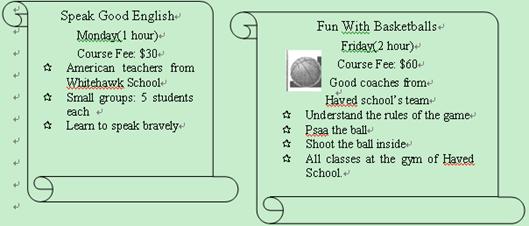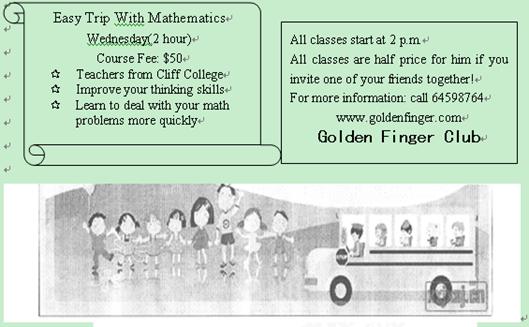
題目列表(包括答案和解析)


Spend your summer holidays wisely!


1. Where will you have classes if you like playing basketball?
A. At Cliff College. B. At Golden Finger Club.
C. At Whitehawk School D. At Haved School.
2. The underlined word “Fee” in the ad is about “________”.
A. the money B. the teacher C. the address D. the school
3.How much will they pay if Darning and his deskmate take part in “Speak Good English”?
A. $15 B. $30 C. $45 D. $60
4. All classes will end after _________.
A. 1 p.m. B. 2 p.m. C. 3 p.m. D. 4 p.m.
5. What is the aim of “Easy Trip with mathematics”?
A. To help students finish their homework.
B. To make students’ thinking skills better.
C. To show you some rules of the math class.
D. To teach students to speak in class bravely.
In the Caucasus region(高加索地區(qū)), nearly 50 out of every 100,000 people live to celebrate their 100th birthday, and many don’t stop at 100! By comparison, in America only 3 people in 100,000 reach 100. But these Caucasus people aren’t alone. The Pakistani Hunzas, who live high in the Himalaya Mountains, and the Vilcabambans of the Andes Mountains in Ecuador seem to share the secret of long life too.
These peoples remain healthy in body and spirit despite the passage of time. While many older persons in industrial societies become weak and ill in their 60s and 70s, some Caucasus people aged 110-140, work in the fields beside their great-great-grandchildren. Even the idea of aging is foreign to them. When asked, “At what age does youth end?” most of these old people had no answer. Several replied, “Well, perhaps at age 80.” The very youngest estimate was age 60.
What accounts for this ability to survive (live) to such old age, and to survive so well? First of all, hard physical work is a way of life for all of these long-lived peoples. They began their long days of physical labor as children and never seem to stop. For example, Mr. Rustam is 142 years of age. He remembers his life experience: the Crimean War of 1854; the Turkish War of 1878; the Bolshevik Revolution in 1917. His wife is 116 years old. They have been married for 90 years. Mr. Rustam has no plan of retiring from his life as a farmer. “Why? What else would I do?” he asks. Oh, he’s slowed down a bit. Now he might quit (stop working) for the day after 6 hours in the field instead of 10.
All these people get healthful rewards from the environment in which they work. They all come from mountainous regions. They live and work at elevations(海拔)of 5,000 to 12, 000 feet(1,660 to 4,000meters) above sea level. The air has less oxygen and is pollution-free. This reduced oxygen environment makes the heart and blood vessel(血管)system stronger.
Another factor(因素)that may lead to the good health of these people is their isolation. To a great extent, they are separated from the pressure(壓力)and worries of industrial society.
Inherited(遺傳的) factors also play some role. Most of the longest-lived peoples had parents and grandparents who also reached very old age. Good family genes may, therefore, be one factor in living longer.
Finally, although these three groups don’t eat exactly the same foods, their diets are similar. All of them eat little animal meat. Their diets are full of fresh fruits, vegetables, nuts, grains, cheese and milk. They never eat more food than their bodies need.
It is clear that isolation from urban pressure and pollution, clean mountain air, daily hard work, moderate diets, good genes, and a youthful approach to life all lead to the health and remarkable long life of all these people.
1. What is the main idea of this article?
A.Cause and effect of long-lived life.
B.People in the world enjoying a longer life.
C.Factors leading to the health and long life of people.
D.A description of several societies where people living a long life.
2. “The idea of aging is foreign to them” means that _________.
A.they don’t care much about their age
B.they have no idea of how old they are
C.they won’t say anything about their age until they are asked to
D.the idea of getting old has never come into their mind
3. How do you think the writer feels about these long-lived people?
A.He is much impressed with them.
B.He doesn’t care a bit about them.
C.He hopes that they will live a still longer life.
D.He doesn’t think their life is full of pressure and worries.


Spend your summer holidays wisely!

【小題1】 Where will you have classes if you like playing basketball?
| A.At Cliff College. | B.At Golden Finger Club. |
| C.At Whitehawk School | D.At Haved School. |
| A.the money | B.the teacher | C.the address | D.the school |
| A.$15 | B.$30 | C.$45 | D.$60 |
| A.1 p.m. | B.2 p.m. | C.3 p.m. | D.4 p.m. |
| A.To help students finish their homework. |
B.To mak e students’ thinking skills better. e students’ thinking skills better. |
| C.To show you some rules of the math class. |
| D.To teach students to speak in class bravely. |
During my second year of middle school, our teacher gave us a test. I studied hard and __46 well in all the subjects, so the questions were not difficult for me. 47 I stopped when I read the last one:“What is the 48 of the woman that cleans the school?”
Of course this was a joke. I saw the cleaning woman every day. She was short and about 60 years old. She had dark hair. But 49 would I know her name? I had never talked __50 her before. In fact, I had never even thought about talking to her. I started to feel rather guilty(慚愧的).Finally, I 51 my paper, without finishing the last question.
Before the class ended, one student asked, “Will be last question count(計(jì)入) toward __52 grade?” “Of course,” the teacher said, “In your life, you will meet many people. All are important. They deserve(值得) your attention and care, even if you just 53 and say hello to them.”
I’ve never forgotten that 54 _. I should get to know all of the people who work and live around me. That was, perhaps, the most 55 lesson of my life. Later, I learned that the cleaning woman’s name was Dorothy.
| 【小題1】 |
|
| 【小題2】 |
|
| 【小題3】 |
|
| 【小題4】 |
|
| 【小題5】 |
|
| 【小題6】 |
|
| 【小題7】 |
|
| 【小題8】 |
|
| 【小題9】 |
|
| 【小題10】 |
|
百度致信 - 練習(xí)冊(cè)列表 - 試題列表
湖北省互聯(lián)網(wǎng)違法和不良信息舉報(bào)平臺(tái) | 網(wǎng)上有害信息舉報(bào)專區(qū) | 電信詐騙舉報(bào)專區(qū) | 涉歷史虛無主義有害信息舉報(bào)專區(qū) | 涉企侵權(quán)舉報(bào)專區(qū)
違法和不良信息舉報(bào)電話:027-86699610 舉報(bào)郵箱:58377363@163.com